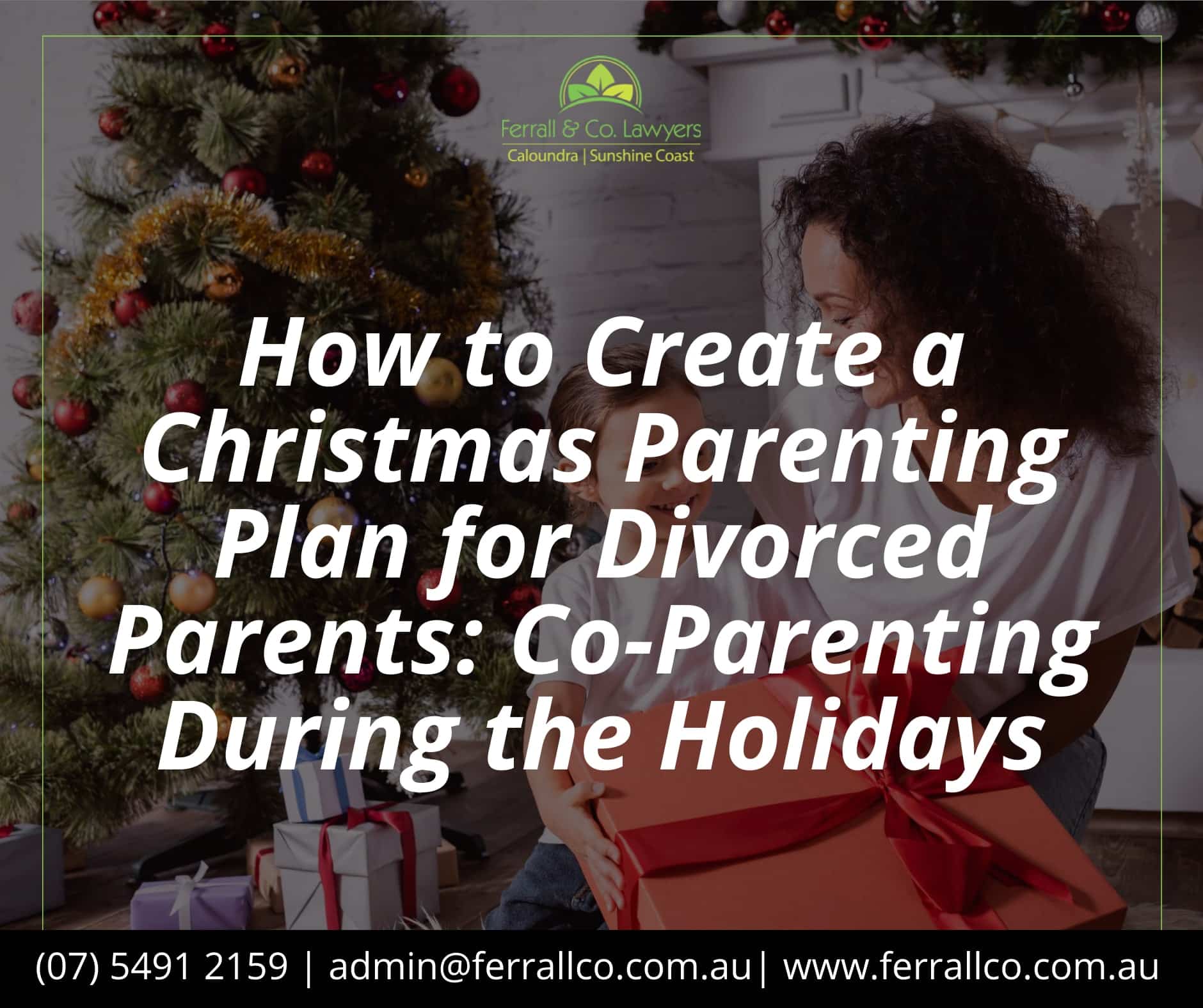
Co-parents can make the Christmas season wonderful for the children and the family. You just need some common-sense planning. Parenting plans are a flexible way of clarifying arrangements for the care of the children. They are recognised under section 63 of the Australian Family Law Act.
How do you create a parenting plan for divorced parents to make a happy holiday for your child? With thoughtful communication and cooperation, you can ensure the holiday is enjoyable for every child involved. If disputes arise, the Family Court can provide guidance and legal backing to formalize arrangements that prioritize the child’s best interests.
Quick points
Parenting plans have advantages over parenting orders.
Plan early.
Be fair.
Decide who will buy what gifts for the children.
Communicate to avoid confusion.
Have dispute resolution mechanisms in place for when things go wrong.
Include extended family.

Why a parenting agreement plan?
The flexibility of parenting plan for divorced parents
Parenting agreement plans have advantages over other methods, like consent orders. They aren’t legally binding, which can be a good thing in some cases, as they can be changed easily to accommodate the child’s changing needs.
There’s no legal consequence if a parent doesn’t strictly follow one of the plan’s terms, allowing for flexibility in addressing the child’s best interests. This adaptability can help parents focus on what works best for the child without the constraints of legal enforcement.
Building collaboration through leniency
When parents separate, a level of leniency can help build a more collaborative relationship with your co-parent, fostering a positive environment as your child grows. A written parenting plan can outline agreed terms, ensuring clarity and reducing misunderstandings. By prioritizing the child’s needs, parents can create a plan that works for the child’s well-being and ensures the child’s best interests are always at the forefront.
Such a plan can include arrangements for child support, parenting schedules, and other essential details. However, it is important to remember that while parenting agreement plans are flexible, they are not legally enforceable.
Addressing disputes and ensuring stability
If disputes arise or more structure is required, parents should seek legal advice and obtain a parenting order. A parenting order prioritizes the child’s best interests and ensures that both parties, including the other party, adhere to the agreement.
This approach helps create a stable framework for the child’s well-being, addressing the child’s emotional and physical needs. By focusing on the child’s care and providing clarity, parents can ensure that the child thrives in a positive environment. Ultimately, this helps both parents work together to make decisions that are in the best interests of the child.

Plan parenting arrangements early.
Start parenting arrangements early.
Don’t leave your parenting agreement to the last minute. Give each other plenty of time to get organised for the sake of the children. Use family dispute resolution to help resolve any issues, ensuring that both the child’s needs and the children’s welfare are prioritized.
Consider creating a comprehensive parenting plan that outlines arrangements for the children and ensures each child feels supported and cared for. By planning ahead, you can create a stable and positive environment for all children involved.
Adjustments and welfare for the holidays
Making adjustments early ensures the holidays run smoothly and prioritizes the child’s best interests. When planning for children’s welfare, ensure both parties make a genuine effort to reach an agreement that works for everyone involved.
Open communication helps address the needs of all children, ensuring that each child feels included and cared for. By focusing on creating a plan that works for the children, parents can provide stability and joy for every child during the holiday season.
Resolving disputes for the children’s well-being
If disputes arise and cannot be resolved, seeking legal advice is essential to ensure the well-being of the children. In some cases, a parenting order or court order may be necessary to formalize arrangements and provide clarity. This ensures that all parties, including the other party, understand their responsibilities and that the child’s needs remain the priority.
By effectively addressing disputes, parents can create a stable environment for their children and ensure their emotional and physical well-being. Ultimately, the child’s best interests should always guide decision-making.

Be fair
Develop a parenting agreement and detailed parenting plan to ensure both parents have time with the children. Consider using family dispute resolution to address any disagreements and foster cooperation. Seeking legal advice can also help avoid resentment and make shared parenting smoother and more effective.
When making parenting arrangements, consider alternating the days to ensure fairness and prioritise the child’s best interests. For example, the child could spend Christmas Eve with one parent and Christmas Day with the other.
This approach can be included in a parenting agreement or parenting plan to provide clarity and reduce the likelihood of disputes. If disputes arise, consider resolving them through mediation before escalating to parenting proceedings. For a legally binding solution, a parenting order can formalise these arrangements and ensure they are upheld.
Splitting the child’s time on Christmas Day between both households can be a practical solution in parenting matters, provided you and the other parent live close to each other. This arrangement ensures the child’s best interests are prioritized, allowing them to spend meaningful time with both parents.
To avoid misunderstandings, include this plan in a formal parenting agreement or seek a parenting order to make it legally enforceable. If disputes arise, focus on resolving them amicably to prevent unnecessary psychological harm to the child and maintain a positive shared parenting relationship.
Consider arranging for the child to spend the holidays with each parent in alternate years as part of your parenting matters. This approach ensures fairness and focuses on the child’s best interests.
The other party can maintain contact during the holidays through phone or video calls, ensuring ongoing connection and support. If disputes arise, work on resolving disputes early to avoid escalating to a final hearing. For a legally binding solution, a parenting order can formalize these arrangements and provide clarity for all involved.

Gifts
Gifts can be a tricky issue when having a co-parent, especially for split couples navigating shared responsibilities. To avoid potential conflicts, parents can create a parenting agreement that includes clear guidelines for gift-giving, ensuring fairness and cooperation. A parenting plan can outline decision-making processes for major issues, such as holiday gifts or special occasions, helping both parents focus on the children’s happiness.
Collaborative approaches, like purchasing a big gift together, can reduce duplication and disparity in value, emphasizing teamwork for the children’s benefit. If disagreements arise, parents can use family dispute resolution to find common ground. Should conflicts persist, seeking legal advice or pursuing a parenting order can provide clarity and consistency, prioritizing the children’s well-being.

Communicate clearly
When creating a parenting agreement to provide guidance for children’s care, both parents should be aware of their responsibilities. Develop a clear and straightforward parenting plan in plain language—the simpler, the better—to avoid ambiguity, as complexity invites misinterpretation. The plan should address decision-making for the child and other key aspects of children’s care. Ensure the parenting plan aligns with any existing parenting orders to avoid disputes.
If one parent or the other party has concerns, seek legal advice to resolve any disagreements effectively. A well-prepared parenting agreement can help the court finds that the arrangements are in the best interests of the children. Both parents should sign and date the plan and keep a copy for reference, ensuring it supports the children’s care and well-being.

Family dispute resolution in the Family Court
Resolving Disputes Through Parenting Agreements and Plans
Include how you will resolve disputes as part of your parenting agreement or parenting plan to provide guidance for both parents and ensure the children’s best interests are prioritized. Outline clear steps for decision-making, allowing both parents to have input while respecting the perspective of one parent or the other. This ensures that arrangements for the child’s care, child support, and parental responsibility are handled collaboratively.
Creating a Clear Plan for Parenting Discussions
Write down what will be discussed to avoid wasting time on irrelevant matters and to focus on what benefits the children. This ensures that both parents remain focused on the child’s needs and create a structured plan for their care. If you want the agreement to be legally enforceable, consider applying for consent orders or a parenting order to formalize the arrangement and provide a clear framework for both parents to follow.
Building a Positive and respectful Co-parenting relationship
Remaining respectful throughout the process helps foster cooperation between parents and ensures the child’s emotional and physical well-being. A well-thought-out plan benefits the children by creating stability and reducing conflict. By prioritizing the child’s best interests, parents can build a positive shared parenting relationship that supports the children as they grow.
Constructive Communication Under the Family Law Act
Use empathetic language in your parenting agreement or parenting plan. Remember that you and the other parent ultimately want the best for your child. Approach issues as a team, fostering collaboration and mutual respect.
If needed, consider making the agreement legally binding by applying for a parenting order under family law to ensure clarity and enforceability. This approach helps create a positive co-parenting environment while prioritizing the child’s best interests.
“I know this conversation is hard. We need to listen to each other.”
“The kids want to spend time with both of us. Can we create more equal visitation?”
“We both want this to work. We can solve this together.”
“I get your concerns. What’s most important are the kids.”
This language isn’t divisive. It focuses on solutions that centre the children. This is the key to approaching issues constructively.
A professional mediator can help.
Include extended family
Include relatives in your parenting arrangements to ensure your child can enjoy the joy of spending time with their whole family. This is often in the child’s best interests and can help defuse tension between you and your ex-partner or the other parent. When creating a parenting order, consider how the relative’s involvement can be incorporated to provide emotional support for the child. Ensuring the arrangements prioritize the child’s happiness and stability is essential.
Making these arrangements legally binding ensures clarity and consistency, helping everyone focus on the holidays as a time for fun and family connection. By involving relatives in the parenting agreement, parents can create a positive environment where the child feels loved and supported, ensuring the child’s best interests remain the priority.

Conclusion
A parenting plan is a flexible way to organise parenting arrangements with your ex-partner. While parenting plans are not legally binding, this flexibility can be advantageous, as they don’t need to meet the requirements of the Family Court or the Federal Circuit. This allows parents to adapt the plan to the changing needs of their children as the children grow. A well-crafted parenting plan ensures the child’s best interests remain the focus, fostering a cooperative relationship between parents and providing stability for the child’s well-being.
However, if there are concerns about family violence or child abuse, obtaining a parenting order is a safer option as it provides more protection and is legally enforceable. Ultimately, whether you choose a parenting agreement, plan, or order, prioritising the child’s best interests is essential. A parenting order ensures the child’s safety and well-being, offering legal backing for the arrangements. By focusing on the child’s needs, parents can create a secure environment for the child. Ensuring the child’s happiness should be the primary goal, as every child deserves a harmonious and joyful Christmas that supports their growth and well-being.
Rowena, Thankyou for your support during our difficult time. Not only are you and your staff very approachable and friendly, but you got the job done. Very highly recommended.
Seek legal advice. We offer a free consultation.






